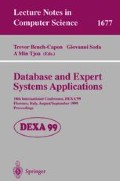Abstract
The software evolution is a challenge for engineers. In fact, the high complexity of the software makes it difficult to perform the change. This may cause serious damage in the infodation system. Within the infomation system cooperating by the way of federation, the effects are more critical. It appears necessary to provide tools that support the a priori chauge impact analysis. In this paper, we propose the Source Code Software Components Structural Model (SC2SM). This models applications manipulating persistent objects, stored in an ODMG-compliant database system. The SC2SM defines software components multigraphs, that represent local and federated database schemas, programs source codes and their relationships. The multigraph representation is the way to process the u priori change impact analysis, using a knowledge base system.
Access this chapter
Tax calculation will be finalised at checkout
Purchases are for personal use only
Preview
Unable to display preview. Download preview PDF.
References
Edith Au and Dave Makower. Java Programming Basics. 1996.
S. Barros. Analyse a priori des conséquences de la modification de systèmes logiciels: de la théorie à la pratique. PhD thesis, UniversitC Pad Sabatier Toulouse, 1997.
H. Basson. Contrôle de l’evolution des logiciels: modélisation pour l’analyse d’impact des modifications. Document HDR, Université de Nancy I, Déc 1998.
Z. Bellahsene. Extending a view mechanism to support schema evolution in federated database systems. In Proceedings of the eigth International Conference on Database and Expert Systems Asplication, pages 573–582, September 1997.
M. Bouneffa and N. Boudjlida. Managing schema changes in oject-relationship databases. In Proc. of the 14th. International Conference On Entity-Relationship and Object-Oriented Modeling, LNCS, Brisbane, Qweensland Australia, dec 1995. Springer-Verlag.
Rick G. G. Cattel. ODMG-93 Obejct-Oriented Databases Standard. International Thomson Publishing, 1995.
L. Deruelle. Analyse de l’impact de 1’évolution des applications orienté-objet, mémoire de d.e.a. Technical report, Université de Me, 1998.
Object Design. Bookshelf for ObjectStore PSE Pro Release S.0 for Java. http://www.objectdesign.com/, January 1998.
Fabrizio Ferrandina, Thorsten Meyer, and Roberto Zicari. Schema and database evolution in the 02 object database system. In Proceedings of the 21th International Conference on Very Large Databases, Zurich, Switzerland (VLDB’ 95), September 1995.
Ernest J. Fkiedman-Hill. Jess 4.3 User’s Manual. Sandia National Laboratories, December 1998.
J.M. Geib, C. Gransart, and P. Merle. Corba des Concepts à la Pratique. InterEditions, 1997.
Joseph C. Giarratano. CLIPS User’s Guide, August 1998.
JM. Hannoff, JC. Nicolas and F. Hemery. Approach to services uses in federated information systems. In 8th. International Conference on Datubuse and Expert System Application (DEXA’ 971, Todouse, France, Septembre 1997. IEEE.
D. Heimbigner and D. MacLeod. A federated architecture for information management. ACM Transactions on Ofice Information Systems, pages 253–278, July 1985.
Won Kim. Object-oriented databases definition and research directions. Microelectronics and Computer Technonology Corporation 3500 West Balcones Center Drive Austin, Texas 78759, 1989.
N. Melab, H. Basson, M. Bouneffa, and L. Deruelle. Object-oriented Code: Profiling and Instrumentation. In The proc. of the IEEE Intl. Conf. on Software Maintenance (IEEE-ICSM’99), Oxford,, 1999.
Sun Microsystems. The Java Compiler Compiler Documentation. http://www.sun.com/suntest/products/JavaCC/, January 1999.
G. Murphy. Lightweight Structural Summarization as an Aid to Software Evolution. PhD thesis, University of Washington, July, 1996.
A.P. Sheth and J.A. Larson. Federated databases systems for managing distributed, heterogenous, and autonomous databases. A CM Computer Surveys, pages 183–236, September 1990.
B. Stroustrup. C++ Programming Language. Adison Wesley, 1991.
Author information
Authors and Affiliations
Editor information
Editors and Affiliations
Rights and permissions
Copyright information
© 1999 Springer-Verlag Berlin Heidelberg
About this paper
Cite this paper
Deruelle, L., Bouneffa, M., Goncalves, G., Nicolas, J. (1999). Local and Federated Database Schemas Evolution. An Impact Propagation Model. In: Bench-Capon, T.J., Soda, G., Tjoa, A.M. (eds) Database and Expert Systems Applications. DEXA 1999. Lecture Notes in Computer Science, vol 1677. Springer, Berlin, Heidelberg. https://doi.org/10.1007/3-540-48309-8_85
Download citation
DOI: https://doi.org/10.1007/3-540-48309-8_85
Published:
Publisher Name: Springer, Berlin, Heidelberg
Print ISBN: 978-3-540-66448-2
Online ISBN: 978-3-540-48309-0
eBook Packages: Springer Book Archive

